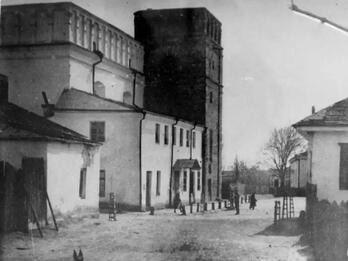Shire Yehudah (The Songs of Judah)
Let the elders rejoice and the discerning be glad, the students and rabbis be happy, and the princes and the officers, and the wealthy and the needy exult, with the poor and those lacking sustenance, and let the singers and cantors shout for joy, and let them declare their belief in the Torah of Moses, old and young alike, on seeing these two precious and pleasing songs composed by me in honor of the Creator of the mountains. I did this because I saw the evil perpetrated under the sun [see Ecclesiastes 5:12] by members of our nation who occupy themselves with strange, alien chants that were not held in esteem by our ancestors [see Deuteronomy 32:17], parents, and teachers. Specifically, they take no care to refrain from such practices at mandatory religious feasts. And not only are no words of Torah, like those handed down from Sinai, exchanged among them, but the youth and the adults do even worse—they drink wine and beer, frittering away their time at the feast with empty words, idle vanities, and strange noises, and even mockery. They are only minutely [see Isaiah 16:14] troubled by the length of the exile and the destruction of our holy Temple, destroyed because of our sins, as the psalmist declared: Let my tongue cleave to my palate if I do not remember you; if I do not raise Jerusalem even above my highest joy! (Psalms 137:6). And by such conduct they prolong the exile, in our many sins, and confer power upon the forces of evil—and Satan dances among them and rejoices at their feasts. Do not let your hearts deceive you into saying, “See, this is something new,” for it has already existed, in the ages which were before us [see Ecclesiastes 1:10]. The great sage, my teacher and master, the great preacher, may his soul rest in peace, our teacher, R. Bezalel [ben Solomon of Korbyn (1640–1691)], author of Pelaḥ ha-rimon [Slice of Pomegranate] and ‘Amudehah shiv‘ah [Her Pillars are Seven], who pondered, sought out, and set in order (Ecclesiastes 12:9) such a beautiful melody in the holy tongue and in German, to be chanted at all mandatory feasts and at voluntary meals, in order to recall the destruction of our holy Temple, as stated.
However, there is no memory of this in either former or later times [see Ecclesiastes 1:11]. And as I saw the oppression, the distress suffered by the poor among our nation in these generations—due to our many sins—[ . . . ] and that when the youth mature, from the age of thirteen upward, they jettison the yoke of Torah and occupy themselves with business; it being acknowledged that the prolonging of the exile is due to the sin of neglecting Torah study, as mentioned in the Yalkut ḥadash [a homily collection (1648)]. I have elaborated somewhat on this topic in a commentary on the melody already composed by me in honor of a Torah scroll that is donated to a synagogue, and which is still in my safekeeping. May the Almighty grant me the merit of publishing it, for the benefit of the public.
Now, should someone ask, “Did not our sages institute that a public Torah discourse be delivered at every mandatory feast, to fulfill our rabbis’ declaration [m. Avot 3:6]: ‘When ten sit and occupy themselves with words of Torah, the Divine Presence rests among them etc.’? Why, then, should the occasion of such a feast be wasted with these songs?”
One should reply thus to him, “This is certainly true, and your words are correct; this is a good and fine custom; would that we were inclined to act accordingly always [see Deuteronomy 5:25].” However, [ . . . ] I have observed a novel, evil custom developing among us—for Satan’s work has thrived because of our many sins—that whenever the preacher commences his public discourse at the sacred table, it is impossible to hear a single word from him owing to the mighty tumult created by the masses, and their exceedingly loud shouting. And even those empowered to protest do not reproach or dissuade them from this evil practice, thus causing the preacher to conclude prematurely, and end his discourse against his will. Pray consider this terrible iniquity, my brethren; what right, then, do we possess to cry out to the King, Ruler of the Universe?
Now my heart became exceedingly faint [see Jeremiah 8:18], and my countenance fell upon recalling this. And as I saw that songs and melodies were loved by the masses, I accordingly set my mind to seek and investigate [see Ecclesiastes 1:13] and to compose these melodies, for them to sing: somberly at first, to bestir the people’s hearts through recollection of the destruction of our holy Temple, destroyed for our sins, and subsequently to draw their hearts close to the Almighty’s consolations, as He promised us through the prophet Jeremiah: Thus says the Lord: Refrain your voice from weeping, and your eyes from tears; for your work shall be rewarded, says the Lord, and they shall come back from the land of the enemy. And there is hope for thy future, says the Lord, and your children shall return to their own border (Jeremiah 31:16–17). And therefore, I concluded the first song with the consolations to our mother Rachel, for we are redeemed in her merit, as these consolations were addressed to her.
And my witness is on High and in the heavens above that I did this not for my own glory but for the glory of the Unity of the Holy One and His Divine Presence, which is with us in the exile, as is written: I am with him in distress (Psalms 91:15), and for the honor of my teacher and master, author of the aforementioned Pelaḥ ha-rimon. Perhaps it will please the masses, and they will incline their ears and hearts, through these songs, to hear the voice of the Lord our God, and the lyrics of this song will be pleasant to them. For many honorable men have already urged me to publish these songs and grant them merit thereby—and may their merit stand for me, my children, and my children’s children, in good stead forever.
I started the first song in the same manner as the beginning of the song composed by the aforesaid master, but since I have forgotten that melody and it is no longer in existence, I composed the remaining stanzas in accordance with my limited talent, as I was directed from Heaven, under my name, “Judah Leyb the Cantor, Ḥazak, Amen,” to the melody which most of the people in these lands sing to “For we are your people” [Ki anu amekha] on Yom Kippur. And I composed the second song [ . . . ] to the glory of the Master of the Universe, on the four exiles and redemptions, [the letters of] my name, “Judah Leyb, Cantor and Scribe, Ḥazak, Amen,” likewise appearing respectively at the head of each stanza, which commence in German. It can be sung at every meal, whether a mandatory feast or a voluntary repast. And in particular, those adults and youth who are unlearned and do not know how to occupy themselves with words of Torah should sing these songs at the table, thereby fulfilling Zeh Eli, an abbreviation for This is the table that is before the Lord (Ezekiel 41:22)—and it shall be as though they had eaten at the Almighty’s table [see b. Menaḥot 97a].
Credits
Judah Leyb Zelichover, Sefer shire Yehudah (Songs of Judah) (Amsterdam: in offic. Kosman Emrich, 1697).
Published in: The Posen Library of Jewish Culture and Civilization, vol. 5.




